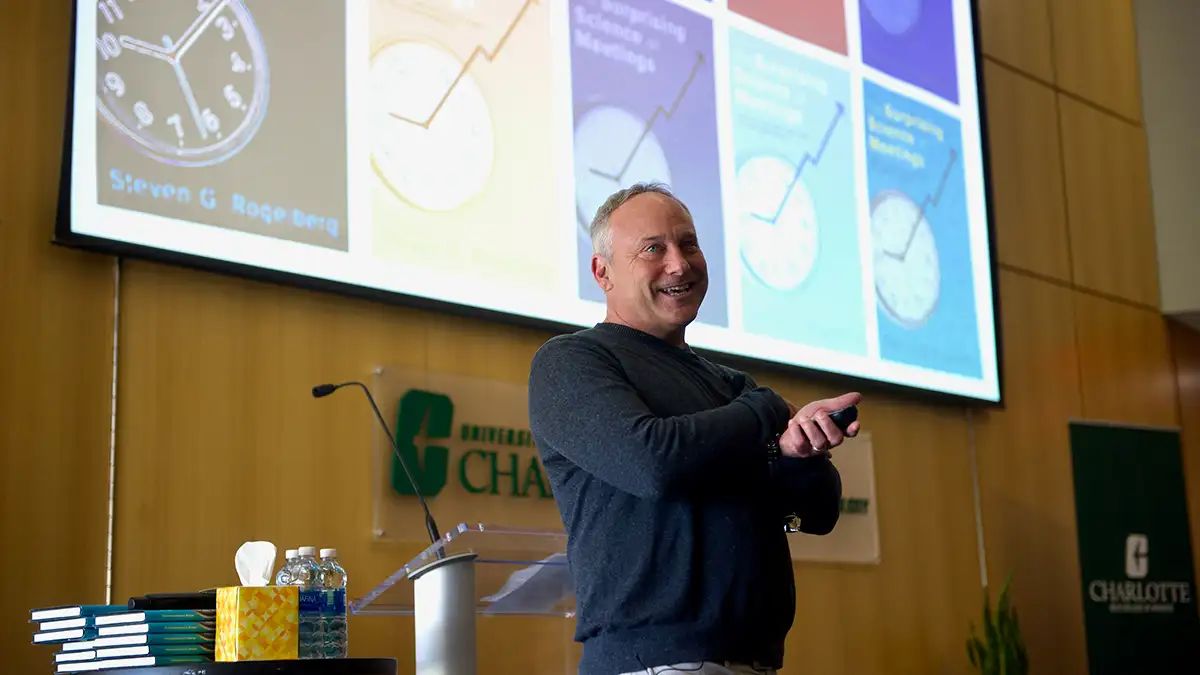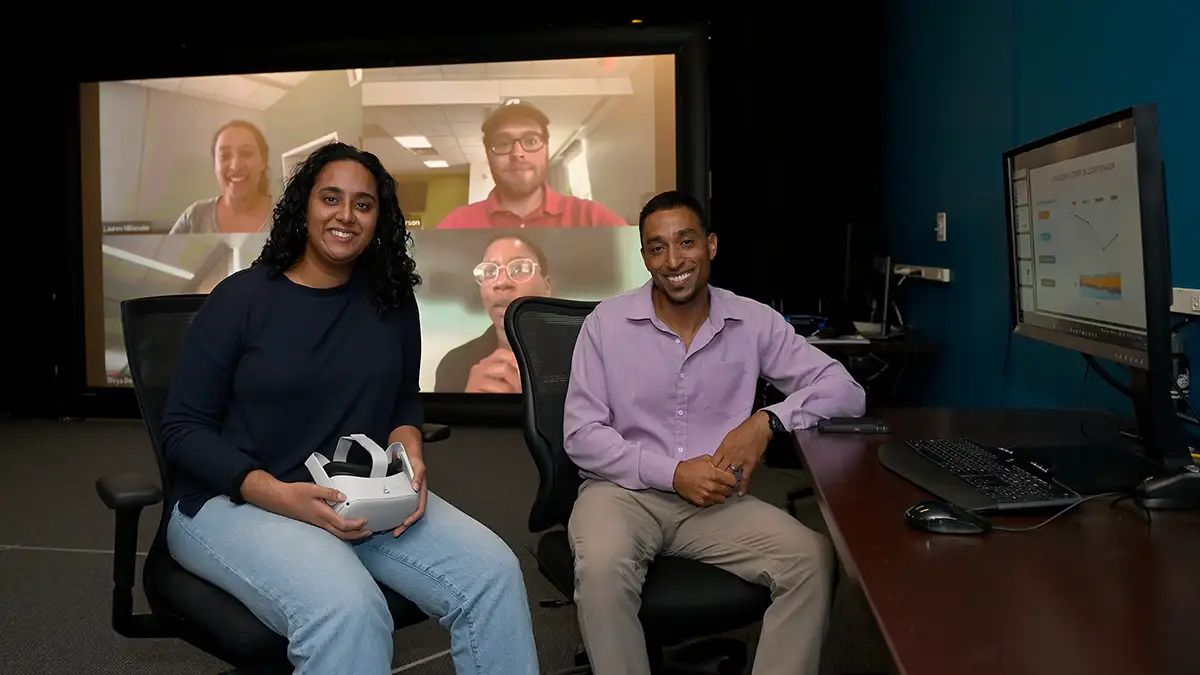REDEFINING
LEADERSHIP
UNC Charlotte’s Center for Leadership Science
is redefining what leadership looks like

At a recent round of community talks, faculty with UNC Charlotte’s Center for Leadership Science kept a close watch on a countdown clock. Each expert had just 240 seconds to translate their research into action-oriented observations for regional leaders to apply in their businesses and organizations.
The lightning-quick remarks sparked conversation and ignited curiosity about leadership dynamics, team effectiveness, the science of meetings and more. Connecting with people beyond academic spaces through outreach in ways like these talks is key to the center’s efforts to redefine leadership and, in turn, influence its application across countless leader development and training programs in business and society.
“Our mission and vision relate to us serving as a catalyst for collaborative science in pursuit of society’s grand challenges,” says center Co-Director George Banks. “Why do we think in terms of grand challenges? Because we believe that the grand challenges that society struggles with are ultimately leadership challenges that can be solved with effective leadership.” Banks is a management and organizational science professor who also is editor-in-chief for “The Leadership Quarterly” journal.
Leadership in context
Through the study of leadership behaviors, traits, styles and impact on individuals, groups and organizations, the center is leveraging science to accomplish three main goals. Those are to redefine the societal meaning of leadership, to inform the way leaders are trained and to improve organizational systems for the benefit of all stakeholders.
“Leadership is something that is socially constructed,” says center Co-Director Janaki Gooty, a management and organizational science professor. “It is not something that is a universal law like gravity. Instead, this is something that we all consensually agree to, as to what leadership means and what leadership does not mean. The work that we are doing with the center is trying to get to more humanized ways of defining leadership.” Gooty is also director of the Charlotte MBA program.
Influence of R1 status
With Charlotte officially joining the top tier of research institutions in the nation through the awarding of its R1 classification this spring, the impact of the center’s research will surely accelerate and deepen, as will other research in the Belk College of Business and throughout UNC Charlotte.
“The Belk College of Business is leading in business innovation, as we solve business problems and fuel the economy through our research and development of talent,” says Dean Richard Buttimer. “This is certainly true of the Center for Leadership Science, with its discovery of new knowledge that shapes how organizations and individuals understand and respond to leadership challenges.”
The center is part of the Belk College of Business, while affiliated faculty come from across the University. Areas of expertise include organizational science, data science and artificial intelligence, industrial and organizational psychology, meetings science, family and work dynamics and other areas.
The heart of Charlotte
The center is located in The Dubois Center at UNC Charlotte Center City, in the middle of the thriving city and its emerging North Tryon Tech Hub. Its space inspires creativity and cooperation among faculty and with graduate and undergraduate students, while offering resources and expertise to other community members. The location is important, as faculty and students work closely with Charlotte businesses and organizations, including many located in the city’s center.
Just across 9th Street sits the University’s new CO-LAB, another collaborative space where entrepreneurs and innovators can access University expertise to tackle real-world challenges. UNC Charlotte Chancellor Sharon L. Gaber describes North Tryon Tech Hub as an ambitious effort to create a dynamic innovation district in the heart of Charlotte, with the University, Charlotte Center City Partners and leaders from the public, private, and philanthropic sectors working together.
Groundbreaking research
Faculty affiliated with the Center for Leadership Science are nationally regarded researchers, some of whom are book authors, and all of them are published in top tier journals and are called upon to present their work at academic conferences. In addition to Banks and Gooty, faculty are:
- Wenwen Dou, Computing and Informatics
- Eric Heggestad, Psychological Science and Organizational Science
- Steven Rogelberg, Chancellor’s Professor, Organizational Science, Management and Psychological Science
- Nicole Strah, Management and Organizational Science
- Scott Tonidandel, Management and Organizational Science
- Jill Yavorsky, Sociology and Organizational Science
To extend the impact of their research beyond the academic space, leadership science faculty regularly provide insights through media interviews, podcasts, social media posts, community talks and other means. They have also created user-friendly resources.
The Belk College of Business’ remarkable faculty — leaders in their fields — play a significant role in ensuring the Charlotte region’s vitality.
The Belk College of Business’ remarkable faculty — leaders in their fields — play a significant role in ensuring the Charlotte region’s vitality.
CLS faculty member Dr. Steven Rogelberg presents his book, “The Surprising Science of Meetings.”
CLS faculty member Dr. Steven Rogelberg presents his book, “The Surprising Science of Meetings.”
AI research
A center team in 2024 was awarded a $692,881 grant from the U.S. Army Research Institute for Behavioral and Social Sciences to discover new ways to enhance leader and team effectiveness in online environments, using AI technologies and diverse fields of expertise. This work and related studies have also received corporate support and other external funding.
Center faculty and graduate students are using artificial intelligence and virtual reality tools to observe and track leader behaviors to evaluate skills and determine steps for improvement, for the ultimate purpose of boosting team performance.
Their research is identifying the specific actions that characterize a leader as charismatic, ethical or transformational, with the goal of teaching existing or emerging leaders to take identified actions while removing guesswork and subjectivity from the leadership development process. The colleagues are building a new methodology for evaluating leaders based on key behaviors and powered by artificial intelligence.
UNC Charlotte has named Banks as co-director of its Charlotte AI Institute, with an eye to accelerating research that spans business, health care, science and the arts while preparing the next generation of professionals.
“The name of the game for UNC Charlotte is interdisciplinary research — it’s what we’re known for,” Banks says. “With CLT AI Institute, the University serves as a connector for our partners in industry, government, education and the nonprofit sector when they seek to collaborate with AI researchers with targeted expertise.”
Impact with students
Doctoral students, particularly with Organizational Science and Computing and Information Systems, often collaborate with faculty from the center and publish research as co-authors.
A recent study in crisis leadership research by center faculty and doctoral students who have gone on to leadership and academic roles was published online in “Journal of Organizational Behavior,” as one illustration of the opportunities to collaborate. The authors studied how leadership unfolded in real time during COVID-19, examining if idealized prototypes reflect the current realities of enacting leadership during a crisis.
Belk College undergraduate students also benefit from the center’s work, notably with initiatives supported by a $1 million gift from UNC Charlotte alumna, business innovator and Board of Trustees emerita Susan Dodson DeVore ’81.
Undergraduates in the Women in Business program, for example, have worked with faculty and doctoral students to prepare for job interviews and networking opportunities. They are using virtual reality headsets as they learn best practices in a low-stress environment in an introduction to leadership aspects that the center team continues to study and illuminate in its ongoing research.
Divya Doshi and program co-director George Banks describe characteristics of leadership seen in virtual interactions to fellow UNC Charlotte Ph.D. students.
Divya Doshi and program co-director George Banks describe characteristics of leadership seen in virtual interactions to fellow UNC Charlotte Ph.D. students.
This custom content is sponsored by UNC Charlotte’s Belk College of Business and developed by Inside Higher Ed's sponsored content team. The editorial staff of Inside Higher Ed had no role in its creation.
REDEFINING
LEADERSHIP
UNC Charlotte’s Center for Leadership Science is redefining what leadership looks like

At a recent round of community talks, faculty with UNC Charlotte’s Center for Leadership Science kept a close watch on a countdown clock. Each expert had just 240 seconds to translate their research into action-oriented observations for regional leaders to apply in their businesses and organizations.
The lightning-quick remarks sparked conversation and ignited curiosity about leadership dynamics, team effectiveness, the science of meetings and more. Connecting with people beyond academic spaces through outreach in ways like these talks is key to the center’s efforts to redefine leadership and, in turn, influence its application across countless leader development and training programs in business and society.
“Our mission and vision relate to us serving as a catalyst for collaborative science in pursuit of society’s grand challenges,” says center Co-Director George Banks. “Why do we think in terms of grand challenges? Because we believe that the grand challenges that society struggles with are ultimately leadership challenges that can be solved with effective leadership.” Banks is a management and organizational science professor who also is editor-in-chief for “The Leadership Quarterly” journal.
Leadership in context
Through the study of leadership behaviors, traits, styles and impact on individuals, groups and organizations, the center is leveraging science to accomplish three main goals. Those are to redefine the societal meaning of leadership, to inform the way leaders are trained and to improve organizational systems for the benefit of all stakeholders.
“Leadership is something that is socially constructed,” says center Co-Director Janaki Gooty, a management and organizational science professor. “It is not something that is a universal law like gravity. Instead, this is something that we all consensually agree to, as to what leadership means and what leadership does not mean. The work that we are doing with the center is trying to get to more humanized ways of defining leadership.” Gooty is also director of the Charlotte MBA program.
Influence of R1 status
With Charlotte officially joining the top tier of research institutions in the nation through the awarding of its R1 classification this spring, the impact of the center’s research will surely accelerate and deepen, as will other research in the Belk College of Business and throughout UNC Charlotte.
“The Belk College of Business is leading in business innovation, as we solve business problems and fuel the economy through our research and development of talent,” says Dean Richard Buttimer. “This is certainly true of the Center for Leadership Science, with its discovery of new knowledge that shapes how organizations and individuals understand and respond to leadership challenges.”
The center is part of the Belk College of Business, while affiliated faculty come from across the University. Areas of expertise include organizational science, data science and artificial intelligence, industrial and organizational psychology, meetings science, family and work dynamics and other areas.
The Belk College of Business’ remarkable faculty — leaders in their fields — play a significant role in ensuring the Charlotte region’s vitality.
The Belk College of Business’ remarkable faculty — leaders in their fields — play a significant role in ensuring the Charlotte region’s vitality.
The heart of Charlotte
The center is located in The Dubois Center at UNC Charlotte Center City, in the middle of the thriving city and its emerging North Tryon Tech Hub. Its space inspires creativity and cooperation among faculty and with graduate and undergraduate students, while offering resources and expertise to other community members. The location is important, as faculty and students work closely with Charlotte businesses and organizations, including many located in the city’s center.
Just across 9th Street sits the University’s new CO-LAB, another collaborative space where entrepreneurs and innovators can access University expertise to tackle real-world challenges. UNC Charlotte Chancellor Sharon L. Gaber describes North Tryon Tech Hub as an ambitious effort to create a dynamic innovation district in the heart of Charlotte, with the University, Charlotte Center City Partners and leaders from the public, private, and philanthropic sectors working together.
Groundbreaking research
Faculty affiliated with the Center for Leadership Science are nationally regarded researchers, some of whom are book authors, and all of them are published in top tier journals and are called upon to present their work at academic conferences. In addition to Banks and Gooty, faculty are:
- Wenwen Dou, Computing and Informatics
- Eric Heggestad, Psychological Science and Organizational Science
- Steven Rogelberg, Chancellor’s Professor, Organizational Science, Management and Psychological Science
- Nicole Strah, Management and Organizational Science
- Scott Tonidandel, Management and Organizational Science
- Jill Yavorsky, Sociology and Organizational Science
To extend the impact of their research beyond the academic space, leadership science faculty regularly provide insights through media interviews, podcasts, social media posts, community talks and other means. They have also created user-friendly resources.
CLS faculty member Dr. Steven Rogelberg presents his book, “The Surprising Science of Meetings.”
CLS faculty member Dr. Steven Rogelberg presents his book, “The Surprising Science of Meetings.”
AI research
A center team in 2024 was awarded a $692,881 grant from the U.S. Army Research Institute for Behavioral and Social Sciences to discover new ways to enhance leader and team effectiveness in online environments, using AI technologies and diverse fields of expertise. This work and related studies have also received corporate support and other external funding.
Center faculty and graduate students are using artificial intelligence and virtual reality tools to observe and track leader behaviors to evaluate skills and determine steps for improvement, for the ultimate purpose of boosting team performance.
Their research is identifying the specific actions that characterize a leader as charismatic, ethical or transformational, with the goal of teaching existing or emerging leaders to take identified actions while removing guesswork and subjectivity from the leadership development process. The colleagues are building a new methodology for evaluating leaders based on key behaviors and powered by artificial intelligence.
UNC Charlotte has named Banks as co-director of its Charlotte AI Institute, with an eye to accelerating research that spans business, health care, science and the arts while preparing the next generation of professionals.
“The name of the game for UNC Charlotte is interdisciplinary research — it’s what we’re known for,” Banks says. “With CLT AI Institute, the University serves as a connector for our partners in industry, government, education and the nonprofit sector when they seek to collaborate with AI researchers with targeted expertise.”
Impact with students
Doctoral students, particularly with Organizational Science and Computing and Information Systems, often collaborate with faculty from the center and publish research as co-authors.
A recent study in crisis leadership research by center faculty and doctoral students who have gone on to leadership and academic roles was published online in “Journal of Organizational Behavior,” as one illustration of the opportunities to collaborate. The authors studied how leadership unfolded in real time during COVID-19, examining if idealized prototypes reflect the current realities of enacting leadership during a crisis.
Belk College undergraduate students also benefit from the center’s work, notably with initiatives supported by a $1 million gift from UNC Charlotte alumna, business innovator and Board of Trustees emerita Susan Dodson DeVore ’81.
Undergraduates in the Women in Business program, for example, have worked with faculty and doctoral students to prepare for job interviews and networking opportunities. They are using virtual reality headsets as they learn best practices in a low-stress environment in an introduction to leadership aspects that the center team continues to study and illuminate in its ongoing research.
Divya Doshi and program co-director George Banks describe characteristics of leadership seen in virtual interactions to fellow UNC Charlotte Ph.D. students.
Divya Doshi and program co-director George Banks describe characteristics of leadership seen in virtual interactions to fellow UNC Charlotte Ph.D. students.
This custom content is sponsored by UNC Charlotte’s Belk College of Business and developed by Inside Higher Ed's sponsored content team. The editorial staff of Inside Higher Ed had no role in its creation.







